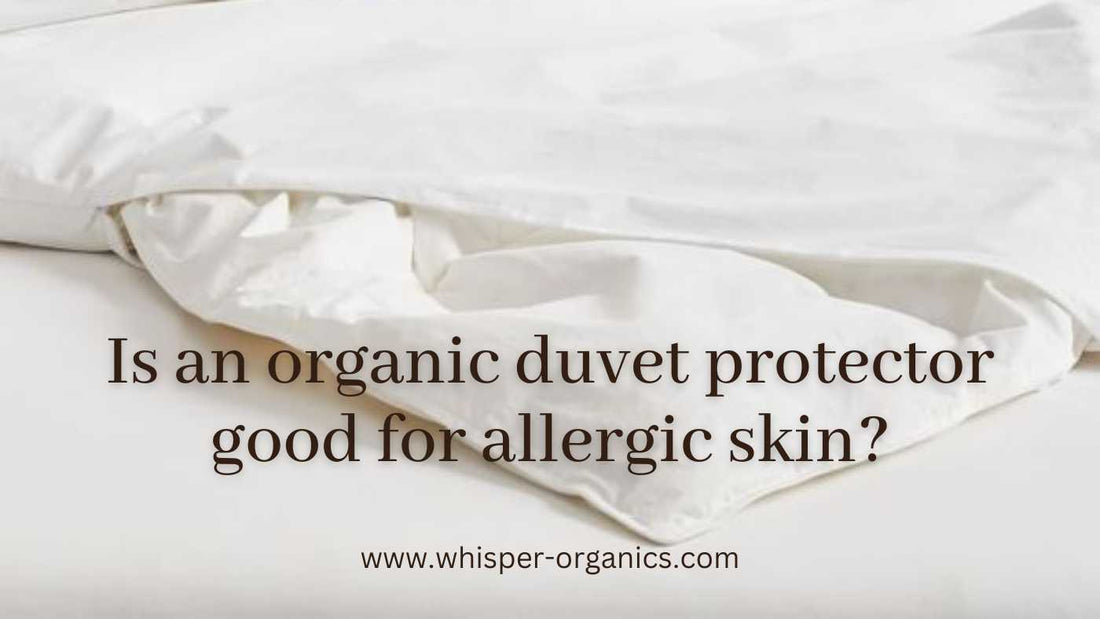The extra warmth and comfort of a thick duvet are what you need on cold nights. To keep it soft, fluffy, and able to fend off winter chills, having a duvet protector is indispensable.
But what if you suffer from allergic skin? Then, the best choice is a naturally hypoallergenic organic duvet protector.
Scroll down and learn more about why an organic duvet protector is good for allergic skin.
Below is the article’s overview:
- - Duvet protectors and skin allergies
- - Allergist-recommended bedding
- - Duvet protectors can shield you from skin allergens
-
- The organic bedding choice
- When you choose organic cotton for your duvet protector - - Why a GOTS-certified organic duvet protector is even better
- - How to care for your organic duvet protector
Duvet protectors and skin allergies
A duvet is a heavy type of bedding. It is a quilted blanket packed with filling to cover you on chilly nights warmly. Fillings can be natural or synthetic.
Duvets have duvet protectors in the same way that pillows have pillowcases, only larger ones.
Duvet protectors, also called duvet covers, can be replaced and washed as needed. So, duvets can be spared from being washed too often and will keep their soft comfort and warmth longer.
What will happen if duvets do not have duvet covers?
A duvet protector is a shield between your duvet and allergens. Allergy triggers include your body’s by-products, such as skin chafing, sweat, and blood that bed critters feed on. Other allergens that can be in your duvet are bed bugs, dust mites, pet dander, chemicals, dust, and molds
Also, duvets have natural or synthetic fillings that attract dust mites and bed bugs. If your duvet is naked and open to all allergens and outside elements, your duvet becomes a haven for allergy triggers. You may likely experience these symptoms:
- - Blocked or runny nose
- - Itchiness of skin
- - Eczema
- - Coughing
Allergic symptoms are manageable. The quality and type of bedding you choose will matter. In the next section, consider what bedding professional health allergists recommend for those suffering from skin allergies.
Allergist-recommended bedding
Itchy skin can deprive you of the good night’s rest you need. Immune system disorders, medications, and infections can cause it. Itchy and sensitive skin caused by allergen triggers are classified as skin allergies, Below are some common skin allergies that cause itch and sensitivity of skin: Atopic dermatitis.
- Atopic dermatitis
is the most common form of eczema, especially among children. It can be triggered by allergens in the environment and irritants such as chemicals and result in inflammation, dryness and itchy skin,
- Allergic contact dermatitis
Contact dermatitis is a condition triggered by direct contact with an allergen. It is uncomfortable and can make the skin itchy, blistered, dry, and cracked.
- Hives (Urticaria).
Hives or Urticaria is a skin condition that triggers skin inflammation when the immune system releases histamine. It results in skin swelling in the deep layers of the skin, usually occurring in the soft tissues of the eyelids, mouth, or genitals. Red raised bumps can appear on inflamed skin and are very itchy.
The duvet protector is your protective allergen barrier. Health professionals recommend dust-mite-proof bedding encasements with 100% cotton as a popular choice among those suffering from skin allergies.
Duvet protectors can shield you from skin allergens
A duvet protector, sometimes called a duvet cover, is your duvet’s protective shield. Your skin is also protected when the allergens below are fended off:
About dust mites and other common duvet allergens
Dust.
Dust is everywhere and contains your body’s by-products, such as skin flakes, hair, and nails. They can even have pet sheddings, dirt, fibers from fabrics used in your home, food crumbs, and insect parts.
Dust mites.
Dust mites are arthropods that are invisible to the eye. They feed on dust particles containing skin cells, insect parts, and animal dander. So, they are likely in your bedding, furniture, and carpets where these particles are present.
An indicator that you have dust mite allergens in your bed is when you experience allergy symptoms like stuffy nose, sneezing, coughing, wheezing, and breathing difficulties.
Mold.
Duvets that are not dried thoroughly or are stored in mold-prone conditions are susceptible to mold growth. Those with skin allergies are protected from direct contact with moldy duvets.
Scroll down and read about the many benefits of using a duvet protector::
It keeps your duvet free from allergens.
Skin allergens are everywhere, especially during cold months, because you spend more time in your house tucked under your duvet.
A duvet protector can shield your duvet from allergens like dust mites, pet dander, chemicals, dust, and molds. It is easy to wash, so changing it as often as needed is convenient without washing your heavy duvet.
It makes for easier upkeep of your duvet.
Keeping a duvet clean is a must, especially for those with skin allergies. Yet, it is a challenge. You need to keep its weight, density, and quality intact when washing in a machine. So, make sure to follow the care label instructions with utmost care.
If your washing machine is not big enough for your duvet, you will need to bring it to a professional dry cleaner to be washed. A duvet protector saves you from washing your duvet often when persistent allergy symptoms happen.
Button or Zipper closure?
Most duvet covers have either of these two kinds of closures: button or zipper:
For more convenience and upkeep, buttons are preferred over zippers because of these reasons:
Buttons allow the closure to follow the soft, fluffy form and feel of the duvet. Zippers are stiff and can stand in the way of comfortable sleeping.
Repairs are minimal and confined to the malfunctioning buttons. Zippers may get stuck and have to be ripped off entirely when damaged. In this case, you may prefer to buy a new duvet protector instead of replacing the zipper.
Buttons are less abrasive, while zippers pose more hazards in skin contact accidents.
Zippers, however, have one advantage. Zippers are easier and quicker to close.
In sum, button closures may take longer to close and open but can provide better comfort and safety for skin allergy sufferers.
Why most allergy sufferers prefer duvet protectors made of organic cotton
Comfortable softness and purity of materials are essential for those suffering from allergies to have a sound sleep. Their hypersensitive skin needs comfortable softness because roughness can agitate and trigger more flare-ups.
Materials must be non-toxic, purely natural, and organic because chemical sensitivities can trigger allergic flare-ups.
In the case of eczema sufferers, getting quality sleep is a challenge. Their bodies need to recover and repair themselves; sleep is the best way to do it.
100% cotton is a popular choice. It checks out on the essentials for comfort and purity and is naturally hypoallergenic. Check the list below of what to look for in your 100% cotton duvet cover:
- Thread count.
Choose organic cotton duvet covers with higher than 100 thread counts because the higher the thread count, the softer and cooler your organic cotton duvet cover will be.
- Breathable fabrics.
Organic cotton textiles are breathable. It means that it absorbs body sweat well and can allow the fluids to evaporate efficiently. Your sleep is more comfortable because you feel cool and dry.
- Certified organic cotton.
Look for certified organic cotton because it is a common occurrence that some businesses lie about having organic products and processes. This unethical behavior is called greenwashing, a fraudulent practice aimed at profiteering.
Global standards set by the likes of Global Organic Textile Standard (GOTS) provides legitimate and excellent quality organic products. Their stamp of approval help consumers quickly identifies authentic organic duvet covers for their health and safety.
Why a GOTS-certified organic duvet cover is even better
Global organic textile standard (GOTS) is the gold standard for organic textiles globally. All GOTS certification assures the public that their approval means quality and legitimacy. GOTS ensures that the entire supply chain of its certified products is genuinely organic.
The GOTS certification also means that the producers follow organic and environmentally friendly farming practices. It includes replenishing the soil with natural and organic means, using low amounts of water, being non-GMO, and being free of toxic and harmful chemicals in the entire process. Workers in GOTS-certified products must also be treated humanely and paid fairly.
So, choose a certified organic cotton duvet cover for your family's good health and peaceful sleep.
How to care for your organic duvet protector
Caring for your organic duvet protector aims at keeping it clean, soft, and fluffy. Here are the tips to keep them in the best condition for many years:
- - Machine wash your duvet protector at low temperatures. Long fibers keep your covers soft and fluffy. So, keep them at a low-temperature wash to keep the threads intact. Warm water is fine and tumble dry them in the lowest setting for machine wash.
- - Wash only when needed. Avoid frequently repeated washings to keep the fibers in the best condition.
- - Follow care instructions carefully. Read the care instructions to keep your duvet cover soft, fluffy, and clean.
Aside from washing your duvet protector, keep your surroundings clean—practice dust mite prevention by vacuuming the entire surface of your duvet, too. Use an allergen-proof vacuum bag when vacuuming your bedroom. This method removes allergens such as dust mites, bed bugs, and pet dander.
CONCLUSION
Skin allergy sufferers need all the comfort and replenishment a good night's sleep offers. So, choosing an organic duvet protector is a healthy and safe choice. It lessens flare-ups and gives your family a peaceful slumber.

